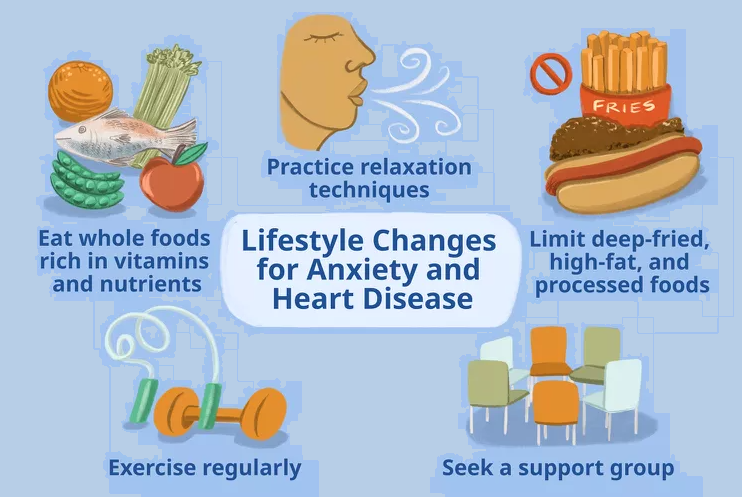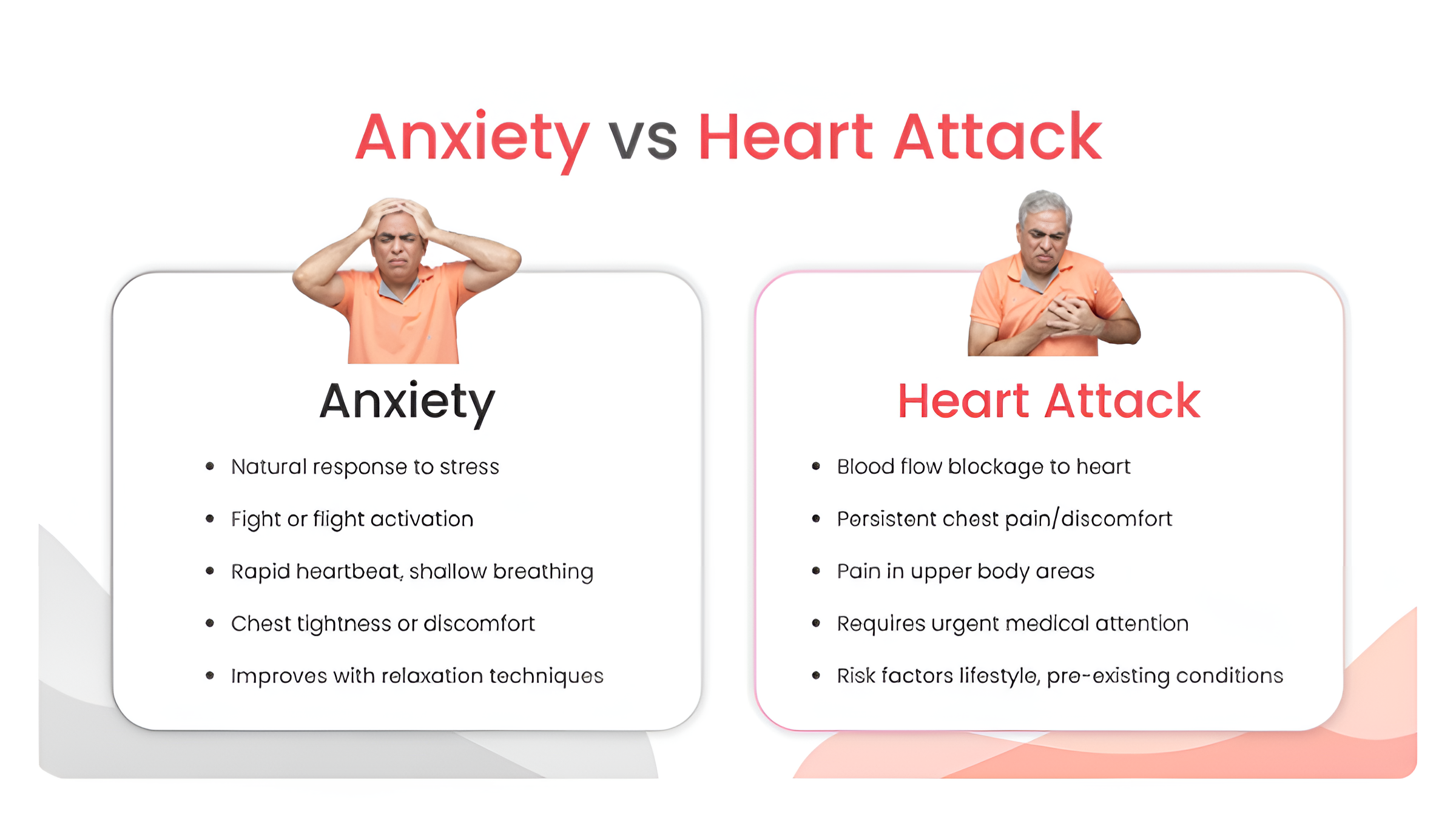Stress and anxiety are natural responses to challenges and pressures, but when they become chronic, they can wreak havoc on both mental and physical health. Beyond the immediate feelings of unease or tension, prolonged stress and anxiety can lead to a wide range of illnesses. One particularly concerning symptom is chest pain, which often raises alarms about heart health. Know illnesses caused by Stress and anxiety, can stress and anxiety cause chest pain?
How exactly do stress and anxiety affect cause chest pain?
Illnesses Caused by Chronic Stress and Anxiety
Chronic stress and anxiety can affect nearly every system in the body. Here are some of the most common illnesses and conditions linked to these mental health issues:
1. Cardiovascular Problems
- Hypertension (High Blood Pressure): Prolonged stress causes the body to release stress hormones like cortisol, which can increase blood pressure over time.
- Heart Disease: Chronic stress contributes to inflammation, a risk factor for heart disease. Anxiety can also lead to behaviours like smoking or overeating, which further increase heart risks.
- Palpitations: Episodes of intense anxiety can cause rapid heartbeats, mimicking heart issues.
2. Digestive Issues
- Irritable Bowel Syndrome (IBS): Stress disrupts the gut-brain connection, often worsening symptoms of IBS, including abdominal pain and bloating.
- Ulcers and Acid Reflux: Chronic anxiety can lead to increased stomach acid production, exacerbating ulcers and acid reflux.
3. Immune System Suppression
Stress weakens the immune system, making the body more vulnerable to infections and illnesses. Over time, it can also contribute to autoimmune diseases, where the body’s immune system attacks its own tissues.
4. Mental Health Disorders
- Depression: Chronic stress depletes serotonin and other neurotransmitters, increasing the risk of depression.
- Panic Disorders: Persistent anxiety can escalate into full-blown panic disorders, marked by frequent and severe episodes of panic.
5. Musculoskeletal Issues
- Chronic Pain: Stress-induced tension in muscles can lead to headaches, back pain, and neck stiffness.
- Temporomandibular Joint (TMJ) Disorders: Anxiety often causes people to clench their jaws, leading to TMJ problems.
6. Respiratory Issues
Stress and anxiety can exacerbate conditions like asthma or lead to hyperventilation, which may cause dizziness or a feeling of breathlessness.
Can Stress and Anxiety Cause Chest Pain?
Yes, stress and anxiety can cause chest pain. While chest pain is often associated with heart problems, it is also a common symptom of anxiety and stress. Here’s how it happens:
1. Muscle Tension
When stressed or anxious, muscles in the chest area may tighten, leading to discomfort or pain. This type of chest pain is often sharp and localized.
2. Hyperventilation
Anxiety can cause rapid, shallow breathing (hyperventilation), which disrupts the balance of oxygen and carbon dioxide in the blood. This may result in chest tightness, dizziness, or a tingling sensation in the extremities.
3. Panic Attacks
During a panic attack, chest pain often accompanies other symptoms like rapid heart rate, sweating, and a feeling of impending doom. The pain may mimic a heart attack but is not caused by a blockage in the arteries.
4. Esophageal Spasms
Stress can cause spasms in the esophagus, the tube that connects the mouth to the stomach. This can feel like chest pain and is often mistaken for heart-related issues.
5. Increased Heart Rate
Anxiety triggers the fight-or-flight response, which increases heart rate and blood pressure. This can lead to sensations of heaviness or pain in the chest.

Differentiating Anxiety-Related Chest Pain from Heart-Related Chest Pain
It’s crucial to distinguish between chest pain caused by anxiety and that caused by heart problems, as the latter can be life-threatening. Here are some key differences:
| Aspect | Anxiety-Related Chest Pain | Heart-Related Chest Pain |
|---|---|---|
| Onset | Sudden, often during anxiety episodes | Gradual, often with exertion |
| Location | Sharp, localized | Pressure, radiating to arm or jaw |
| Duration | A few minutes to hours | Persistent, lasting several minutes |
| Other Symptoms | Hyperventilation, dizziness | Sweating, nausea, shortness of breath |
Important: If you’re experiencing chest pain and are unsure of the cause, seek medical attention immediately. It’s better to rule out serious heart conditions than to assume it’s anxiety-related.
Managing Stress and Anxiety to Prevent Illness
To reduce the risk of stress-related illnesses, it’s essential to manage stress and anxiety effectively. Here are some strategies:
- Mindfulness and Meditation: These practices help calm the mind and reduce stress hormone levels.
- Regular Exercise: Physical activity releases endorphins, which improve mood and reduce tension.
- Healthy Diet: Eating nutrient-rich foods supports overall health and helps regulate mood.
- Professional Help: Therapy, such as cognitive-behavioural therapy (CBT), can help identify and manage the root causes of anxiety.
- Medication: In severe cases, doctors may prescribe anti-anxiety or antidepressant medications. (Alprazolam 1mg, Lorazepam 2mg, Valium 10mg, Clonazepam 2mg)
- Stress-Reduction Techniques: Practices like yoga, deep breathing, and journaling can help manage stress daily.
Conclusion
Illnesses Caused by Stress and anxiety are more than just emotional states—they can have profound effects on physical health. From digestive issues to cardiovascular problems, the impact of chronic stress is far-reaching. While stress and anxiety can indeed cause chest pain, it’s essential to rule out more serious conditions when such symptoms arise. By adopting stress-management techniques and seeking professional support when needed, individuals can mitigate the harmful effects of stress and anxiety on their bodies and minds
